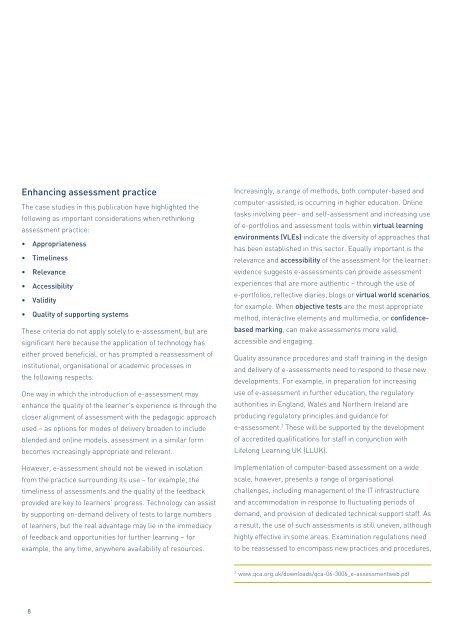Effective Practice with e-Assessment: An overview of ... - Jisc
Effective Practice with e-Assessment: An overview of ... - Jisc
Effective Practice with e-Assessment: An overview of ... - Jisc
You also want an ePaper? Increase the reach of your titles
YUMPU automatically turns print PDFs into web optimized ePapers that Google loves.
Enhancing assessment practice<br />
The case studies in this publication have highlighted the<br />
following as important considerations when rethinking<br />
assessment practice:<br />
• Appropriateness<br />
• Timeliness<br />
• Relevance<br />
• Accessibility<br />
• Validity<br />
• Quality <strong>of</strong> supporting systems<br />
These criteria do not apply solely to e-assessment, but are<br />
significant here because the application <strong>of</strong> technology has<br />
either proved beneficial, or has prompted a reassessment <strong>of</strong><br />
institutional, organisational or academic processes in<br />
the following respects:<br />
One way in which the introduction <strong>of</strong> e-assessment may<br />
enhance the quality <strong>of</strong> the learner’s experience is through the<br />
closer alignment <strong>of</strong> assessment <strong>with</strong> the pedagogic approach<br />
used – as options for modes <strong>of</strong> delivery broaden to include<br />
blended and online models, assessment in a similar form<br />
becomes increasingly appropriate and relevant.<br />
However, e-assessment should not be viewed in isolation<br />
from the practice surrounding its use – for example, the<br />
timeliness <strong>of</strong> assessments and the quality <strong>of</strong> the feedback<br />
provided are key to learners’ progress. Technology can assist<br />
by supporting on-demand delivery <strong>of</strong> tests to large numbers<br />
<strong>of</strong> learners, but the real advantage may lie in the immediacy<br />
<strong>of</strong> feedback and opportunities for further learning – for<br />
example, the any time, anywhere availability <strong>of</strong> resources.<br />
Increasingly, a range <strong>of</strong> methods, both computer-based and<br />
computer-assisted, is occurring in higher education. Online<br />
tasks involving peer- and self-assessment and increasing use<br />
<strong>of</strong> e-portfolios and assessment tools <strong>with</strong>in virtual learning<br />
environments (VLEs) indicate the diversity <strong>of</strong> approaches that<br />
has been established in this sector. Equally important is the<br />
relevance and accessibility <strong>of</strong> the assessment for the learner:<br />
evidence suggests e-assessments can provide assessment<br />
experiences that are more authentic – through the use <strong>of</strong><br />
e-portfolios, reflective diaries, blogs or virtual world scenarios,<br />
for example. When objective tests are the most appropriate<br />
method, interactive elements and multimedia, or confidencebased<br />
marking, can make assessments more valid,<br />
accessible and engaging.<br />
Quality assurance procedures and staff training in the design<br />
and delivery <strong>of</strong> e-assessments need to respond to these new<br />
developments. For example, in preparation for increasing<br />
use <strong>of</strong> e-assessment in further education, the regulatory<br />
authorities in England, Wales and Northern Ireland are<br />
producing regulatory principles and guidance for<br />
e-assessment. 3 These will be supported by the development<br />
<strong>of</strong> accredited qualifications for staff in conjunction <strong>with</strong><br />
Lifelong Learning UK (LLUK).<br />
Implementation <strong>of</strong> computer-based assessment on a wide<br />
scale, however, presents a range <strong>of</strong> organisational<br />
challenges, including management <strong>of</strong> the IT infrastructure<br />
and accommodation in response to fluctuating periods <strong>of</strong><br />
demand, and provision <strong>of</strong> dedicated technical support staff. As<br />
a result, the use <strong>of</strong> such assessments is still uneven, although<br />
highly effective in some areas. Examination regulations need<br />
to be reassessed to encompass new practices and procedures,<br />
3<br />
www.qca.org.uk/downloads/qca-06-3006_e-assessmentweb.pdf<br />
8
















